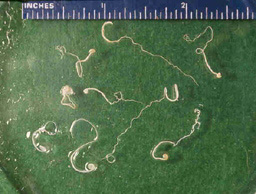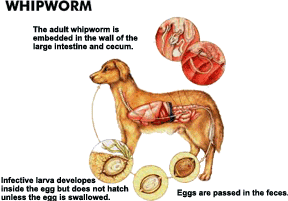How do Whipworms affect you and your dog?
 What
are whipworms?
Whipworms are intestinal parasites which are about 1/4 inch (6 mm)
long. They live in the cecum and colon of dogs where they cause severe
irritation to the lining of those organs. This results in watery, bloody
diarrhea, weight loss, and general debilitation. They are one of the
most pathogenic worms found in dogs. What
are whipworms?
Whipworms are intestinal parasites which are about 1/4 inch (6 mm)
long. They live in the cecum and colon of dogs where they cause severe
irritation to the lining of those organs. This results in watery, bloody
diarrhea, weight loss, and general debilitation. They are one of the
most pathogenic worms found in dogs.
How did my dog get whipworms?
Whipworms pass microscopic eggs in the stool. The eggs
are very resistant to drying and heat, so they can remain viable in the
dog’s environment for years. They mature and are able to reinfect the
dog in 10-60 days. The eggs are swallowed and return to the lower
intestinal tract to complete the life cycle.
How is whipworm infection diagnosed?
Whipworms are diagnosed by finding eggs with a
microscopic examination of the stool. However, multiple samples are
often required because these parasites pass small numbers of eggs on an
irregular basis. Any dog with chronic diarrhea can be reasonably
suspected to have whipworms, regardless of several negative stool
examinations. It is an accepted practice to treat for whipworms based on
assumption of infection. Response to treatment is an indication that
whipworms were present but could not be detected on fecal examination.
How are whipworms treated?
There are several drugs that are very effective
against whipworms. Two treatments are needed at a 3-4 week interval, but
because reinfection is such a problem, it is advisable to treat again
every 3-4 months or to put the dog on a heartworm prevention product
that contains an ingredient that prevents infection with whipworms.
Whipworms are not nearly as common now because of widespread use of the
types of heartworm prevention products.
Can I get whipworms from my dog?
No. Whipworms are not infectious to people; they are
parasites of the dog.

|
